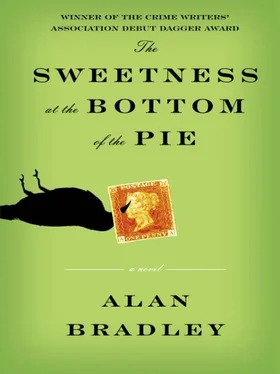Alan Bradley - The Sweetness at the Bottom of the Pie
Здесь есть возможность читать онлайн «Alan Bradley - The Sweetness at the Bottom of the Pie» весь текст электронной книги совершенно бесплатно (целиком полную версию без сокращений). В некоторых случаях можно слушать аудио, скачать через торрент в формате fb2 и присутствует краткое содержание. Жанр: Старинная литература, на английском языке. Описание произведения, (предисловие) а так же отзывы посетителей доступны на портале библиотеки ЛибКат.
- Название:The Sweetness at the Bottom of the Pie
- Автор:
- Жанр:
- Год:неизвестен
- ISBN:нет данных
- Рейтинг книги:3 / 5. Голосов: 1
-
Избранное:Добавить в избранное
- Отзывы:
-
Ваша оценка:
- 60
- 1
- 2
- 3
- 4
- 5
The Sweetness at the Bottom of the Pie: краткое содержание, описание и аннотация
Предлагаем к чтению аннотацию, описание, краткое содержание или предисловие (зависит от того, что написал сам автор книги «The Sweetness at the Bottom of the Pie»). Если вы не нашли необходимую информацию о книге — напишите в комментариях, мы постараемся отыскать её.
The Sweetness at the Bottom of the Pie — читать онлайн бесплатно полную книгу (весь текст) целиком
Ниже представлен текст книги, разбитый по страницам. Система сохранения места последней прочитанной страницы, позволяет с удобством читать онлайн бесплатно книгу «The Sweetness at the Bottom of the Pie», без необходимости каждый раз заново искать на чём Вы остановились. Поставьте закладку, и сможете в любой момент перейти на страницу, на которой закончили чтение.
Интервал:
Закладка:
I remembered, for instance, Maximilian's claim that in the Channel Islands you could raise the hue and cry merely by shouting, “ Haroo! Haroo, mon Prince! On me fait tort! "
Easy to say but hard to do when your mouth's stopped up with cotton and your head's wrapped in a stranger's tweed jacket that fairly reeks of sweat and pomade.
Besides, I thought, there is a notable shortage of princes in England nowadays. The only ones I could think of at the moment were Princess Elizabeth's husband, Prince Philip, and their infant son, Prince Charles.
This meant that, for all practical purposes, I was on my own.
What would Marie-Anne Paulze Lavoisier have done? I wondered. Or for that matter, her husband, Antoine?
My present predicament was far too vivid a reminder of Marie-Anne's brother, cocooned in oiled silk and left to breathe through a straw. And it was unlikely, I knew, that anyone would come bursting into the Pit Shed to haul me off to justice. There was no guillotine in Bishop's Lacey, but neither were there any miracles.
No, reflecting upon Marie-Anne and her doomed family was simply too depressing. I'd have to look to the other great chemists for inspiration.
What, then, would Robert Bunsen, for instance, or Henry Cavendish have done if they had found themselves bound and gagged at the bottom of a grease pit?
I was surprised by how quickly the answer came to mind: They would take stock.
Very well, I would take stock.
I was at the bottom of a six-foot pit, which was uncomfortably close to the dimensions of a grave. My hands and feet were tied and it would not be easy to feel my way around. With my head wrapped up in Pemberton's jacket—and doubtless tied tightly in position with its arms—I could see nothing. My hearing was muffled by the heavy cloth; my sense of taste disabled by the handkerchief stuffed in my mouth.
I was having difficulty breathing and, with my nose partially covered, the slightest exertion used up what little oxygen was reaching my lungs. I would need to remain quiet.
The sense that seemed to be working overtime was my sense of smell, and in spite of my wrapped-up head, the stench of the pit came seeping at full strength into my nostrils. At bottom, it was the sour reek of soil that has lain for many years directly beneath a human dwelling: a bitter scent of things best not thought about. Super imposed upon that background was the sweet odor of old motor oil, the sharp undulating tang of ancient petrol, carbon monoxide, tire rubber, and perhaps a faint whiff of ozone from long-burnt-out spark plugs.
And there was that trace of ammonia I had noticed before. Miss Mountjoy had mentioned rats, and I wouldn't be surprised to discover that they flourished in these neglected buildings along the riverbank.
Most unsettling was the smell of sewer gas: an unsavory soup of methane, hydrogen sulphide, sulphur dioxide, and the nitrogen oxides—the smell of decomposition and decay; the smell of the open pipe from the riverbank to the pit in which I was trussed.
I shuddered to think of the things that might even now be making their way up such a conduit. Best to give my imagination a rest, I thought, and get on with my survey of the pit.
I had almost forgotten that I was seated. Pemberton's order to sit, and his pushing me down, had been so surprising I had not noticed what it was that I sat upon. I could feel it beneath me now: flat, solid, and stable. By wiggling my behind, I was able to detect the slightest give in the thing, along with a wooden creaking sound. A large tea chest, I thought, or something very like one. Had Pemberton put it here in anticipation, before he accosted me in the churchyard?
It was then that I realized I was famished. I had eaten nothing since my skimpy breakfast, which, come to think of it, had been interrupted by the sudden appearance of Pemberton at our window. As my stomach began to send out little pangs of complaint, I began to wish I'd been more attentive to my toast and cereal.
Moreover, I was tired. More than tired: I was totally exhausted. I had not slept well, and the lingering effects of my head cold were further choking off my oxygen intake.
Relax, Flave. Keep a cool head. Pemberton will soon be arriving at Buckshaw.
I had counted on the fact that when he entered the house to retrieve the Ulster Avenger, he would be accosted by Dogger, who would put paid to him in no uncertain terms.
Good old Dogger! How I missed him. Here was this Great Unknown living under the same roof and I had never thought to ask him, face-to-face, about his past. If ever I managed to find my way out of this infernal fix, I vowed that, at the earliest opportunity, I would take him on a private picnic. I would punt with him to the Folly, where I would ply him with Marmite on bread and pump him like billy-ho for all the gory details. He would be so relieved at my escape that he would hardly dare refuse to tell me all.
The dear man had pretended that it was he who had killed Horace Bonepenny, albeit by accident during one of his spells, and he had done so to protect Father. I was sure of it. Hadn't Dogger been there with me in the corridor outside Father's study? Hadn't he overheard, as I had, the row that preceded Bonepenny's death?
Yes, whatever happened, Dogger would look after it. Dogger was fiercely loyal to Father—and to me. Loyal even unto death.
Very well, then. Dogger would tackle Pemberton and that would be that.
Or would it?
What if Pemberton actually made his way into Buckshaw undetected and gained entry to Father's dressing room? What if he stopped the chimneypiece clock, reached behind the pendulum, and found nothing there but the mutilated Penny Black? What would he do then?
The answer was a simple one: He would come back to the Pit Shed and put me to the torture.
One thing was clear: I had to escape before he could return. There was no time to waste.
My knees popped like dry twigs as I struggled to my feet.
The first and most important thing was to make a survey of the pit: to map its features and discover anything that might aid in my escape. With my hands tied behind me at the wrists, I could only map out the concrete wall by going slowly round its perimeter, my back steadied against it, using my fingertips to feel every inch of the surface. With any luck, I might find a sharp projection to use as a tool in freeing my hands.
My feet were tied so tightly I could feel my anklebones grating together, and I had to invent a kind of hopping frog gait. My every move was accompanied by the rustling of old papers underfoot.
At what I judged to be the far end of the pit, I could feel a current of cold air blowing on my ankles, as if there were an opening down near the floor. I turned and faced the wall, trying to hook a toe into something, but my bonds were too tight. Every move threatened to pitch me forward onto my face.
I could feel that my hands were quickly becoming covered with a rancid filth from the walls; the smell of the stuff alone was making me queasy.
What if, I thought, I could climb up onto the tea chest? That way, my head should be above the level of the pit, and there might be some kind of hook higher up the wall: something, perhaps, that had once been used to suspend a bag of tools, or a work light.
But first I had to find my way back to the chest.
Bound and tied as I was, this took far longer than I expected. But sooner or later, I knew, my legs would crash into the thing and, having completed my circumnavigation of the pit, I'd be back where I started.
Ten minutes later I was panting like an Ethiopian hound and still hadn't come up against the tea chest. Had I missed it? Should I carry on or go back the way I came?
Perhaps the thing was in the middle of the pit and I had been tiring myself by hopping in rectangles all round it. By what I could recall of the pit from my first visit—although it had been covered with boards and I had not actually looked down into it—I thought that it could be no more than eight feet long and six wide.
Читать дальшеИнтервал:
Закладка:
Похожие книги на «The Sweetness at the Bottom of the Pie»
Представляем Вашему вниманию похожие книги на «The Sweetness at the Bottom of the Pie» списком для выбора. Мы отобрали схожую по названию и смыслу литературу в надежде предоставить читателям больше вариантов отыскать новые, интересные, ещё непрочитанные произведения.
Обсуждение, отзывы о книге «The Sweetness at the Bottom of the Pie» и просто собственные мнения читателей. Оставьте ваши комментарии, напишите, что Вы думаете о произведении, его смысле или главных героях. Укажите что конкретно понравилось, а что нет, и почему Вы так считаете.












